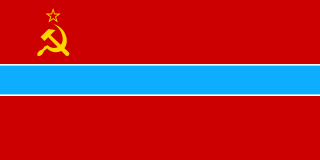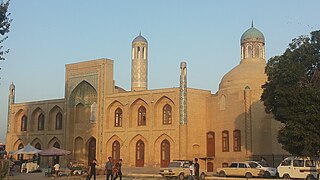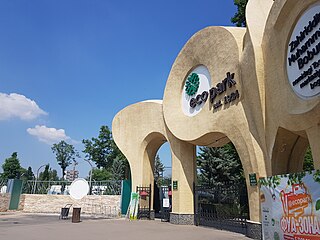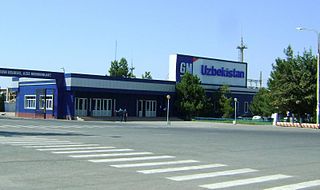
Coca-Cola, or Coke, is a carbonated soft drink manufactured by the Coca-Cola Company. In 2013, Coke products were sold in over 200 countries worldwide, with consumers drinking more than 1.8 billion company beverage servings each day. Coca-Cola ranked No. 87 in the 2018 Fortune 500 list of the largest United States corporations by total revenue. Based on Interbrand's "best global brand" study of 2020, Coca-Cola was the world's sixth most valuable brand.
The economy of Uzbekistan was formerly associated with a Soviet-style command economy, with a slow transformation to a market economy. However, in recent years and since the election of President Shavkat Mirziyoyev the country has seen rapid economic and social reform, aimed at boosting growth and transforming Uzbekistan into a true, modern market economy. International Financial Institutions, including EBRD, Asian Development Bank and the World Bank are actively engaging in supporting Uzbekistan's successful reform process and have rapidly increased their presence in the country.

The Armed Forces of the Republic of Uzbekistan, is the name of the unified armed forces of Uzbekistan, consisting of the Ground Force and the Air and Air Defence forces under the defence ministry. Paramilitary units include the National Guard, a Frontier Service and a River Force. It is reported to be the largest, and the strongest in Central Asia. 'The country [has] also began professionalizing its military, an effort that has only limited success and erratic government support. But even in Uzbekistan, these changes represent merely a modest beginning and most of the benefits are concentrated in a few elite, higher readiness formations rather than uniformly applied to the entire force. The Uzbek military is woefully inadequate, but it is far superior to its neighbours.'

The Uzbek Soviet Socialist Republic, also known as Soviet Uzbekistan, the Uzbek SSR, UzSSR, or simply Uzbekistan and rarely Uzbekia, was a union republic of the Soviet Union. It was governed by the Uzbek branch of the Soviet Communist Party, the legal political party, from 1925 until 1990. From 1990 to 1991, it was a sovereign part of the Soviet Union with its own legislation.

The Coca-Cola Company is an American multinational corporation founded in 1892, best known as the producer of Coca-Cola. The drink industry company also manufactures, sells, and markets other non-alcoholic beverage concentrates and syrups, and alcoholic beverages. The company's stock is listed on the NYSE and is part of the DJIA and the S&P 500 and S&P 100 indexes.

Coca-Cola Amatil Limited (CCA) was an Australian bottler of non-alcoholic beverages that existed from 1904 to 2021, when it merged with Coca-Cola European Partners to form Coca-Cola Europacific Partners. It was one of the largest bottlers of non-alcoholic ready-to-drink beverages in the Asia-Pacific region and one of the world's five major Coca-Cola bottlers. CCA operated in six countries—Australia, New Zealand, Indonesia, Papua New Guinea, Fiji and Samoa. The company also bottled beer and coffee.

Coca-Cola FEMSA, S.A.B. de C.V., known as Coca-Cola FEMSA or KOF, is a Mexican multinational beverage company headquartered in Mexico City, Mexico. It is a subsidiary of FEMSA which owns 47.8% of its stock, with 27.8% held by wholly owned subsidiaries of The Coca-Cola Company and the remaining 25% listed publicly on the Mexican Stock Exchange and the New York Stock Exchange. It is the largest franchise Coca-Cola bottler in the world, the company has operations in Latin America, although its largest and most profitable market is in Mexico.

Gulnara Islamovna Karimova is the elder daughter of Islam Karimov, the president of Uzbekistan from 1991 to his death in 2016. She wielded considerable influence in Uzbekistan owing to her business dealings and family connections. From 2013, due to a conflict with her father, she began to rapidly lose influence.

Namangan Region is one of the regions of Uzbekistan, located in the southern part of the Fergana Valley in far eastern part of the country. It is on the right bank of Syr Darya River and borders with Kyrgyzstan, Tajikistan, Tashkent Region, Fergana Region, and Andijan Region. It covers an area of 7,440 km2. The population is estimated to be 2,931,056 (2022), with 35% of the population living in rural areas. The great river Syrdarya, the main waterway in Central Asia, starts in the territory of Namangan. Syrdarya is formed from inflows of the rivers Naryn and Kara Darya. The Namangan region is very rich in various natural resources. In particular, the region extracts oil in Mingbulak District and big gold and diamond deposits have been discovered in Kosonsoy and Pop Districts. There are also large deposits of uranium, silver, aluminum, tungsten, iron, copper, granite, and marble, among others. There are two big mountain tunnels connecting the Fergana valley with the inner city area and other regions of the country, located in the territory of Namangan.
Namangan is a city in eastern Uzbekistan. It is the administrative, economic, and cultural center of Namangan Region. Administratively, it is a district-level city. Namangan is located in the northern edge of the Fergana Valley, less than 30 km from the Kyrgyzstan border. The city is served by Namangan Airport.

Today, the museums of Uzbekistan store over two million artifacts, evidence of the unique historical, cultural, and spiritual life of the Central Asian peoples that have lived in the region.

Uzbekistan Super League, known as Coca-Cola Uzbekistan Super League due to sponsorship reasons, is the top division of professional football in Uzbekistan. It is operated under the auspices of the Uzbekistan Professional Football League and Uzbekistan Football Association. It was founded in 1992 and currently has 14 teams. The top team qualifies to the group stage of the AFC Champions League.

UzAuto Motors is an automotive manufacturer owned by the Government of Uzbekistan. It is based in Asaka, Uzbekistan. It manufactures vehicles under the marques Chevrolet and Ravon, which is Uzbek for calm and straight road or easy journey.

The Tashkent–Bukhara high-speed rail line is a 600-kilometre (373 mi) high-speed rail connection between Tashkent and Bukhara, two major cities in Uzbekistan. The route passes through six regions: Tashkent, Sirdaryo, Jizzakh, Samarqand, Navoiy, and Bukhara in Uzbekistan. Trains operate seven days a week under the brand name Afrosiyob. The line originally ran from Tashkent to Samarqand, but an extension to Bukhara went into operation on 25 August 2016. Travel from Tashkent to Bukhara, a distance of 600 km (373 mi), now takes 3 hours and 20 minutes instead of 7 hours.

Tashkent Stock Exchange is the major securities trading platform and the only corporate securities exchange in Uzbekistan. It was founded by the government in 1994 as an open joint stock company, located in the capital of Uzbekistan - Tashkent.

Before 1992, Uzbekistan had no automotive industry, being part of the Soviet Union. In post-Soviet times, UzDaewooAuto, SamKochAvto, GM Uzbekistan new auto producing plants were built with South Korean and American help. With production surpassing more than 200,000 per year, Uzbekistan exports automobiles to Russia and other CIS countries.
Fomento Económico Mexicano, S.A.B. de C.V., doing business as FEMSA, is a Mexican multinational beverage and retail company headquartered in Monterrey, Mexico. It operates the largest independent Coca-Cola bottling group in the world and the largest convenience store chain in Mexico. It is also shareholder of Heineken N.V.

The 2020 Uzbekistan Super League was the 29th season of top-level football in Uzbekistan since its establishment on 1992. Pakhtakor Tashkent were the defending champions from the 2019 campaign.
The 2022 Uzbekistan Super League was the 31st season of top-level football in Uzbekistan since its establishment on 1992. Pakhtakor Tashkent were the defending champions from the 2021 campaign, and successfully defended their title.

Jahongir Abidovich Artikkhodjaev is the Mayor (Khokim) of Tashkent City.















